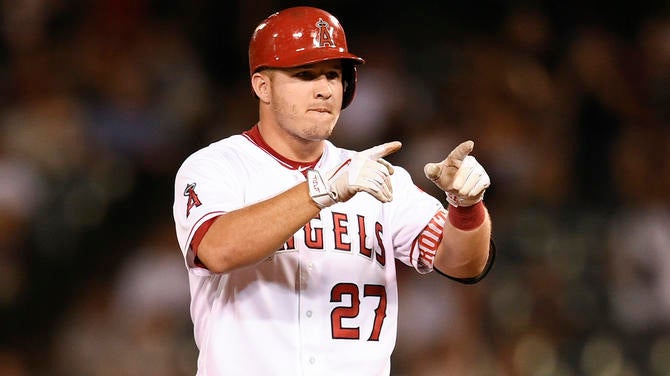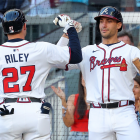Angels center fielder Mike Trout was once again the best player in all of baseball in 2016. On Thursday night, Trout will almost certainly not win the AL MVP award on account of his having bad teammates. That's all it is, really. The Angels were a bad team in 2016, and for reasons sufficient unto themselves some people have come to regard the word valuable as meaning not this ...
adjective valuable \ˈval-yə-bəl, -yə-wə-bəl, -yü-ə-\
- : worth a lot of money
- : very useful or helpful
- : important and limited in amount
Source: Merriam-Webster's Learner's Dictionary
... but rather something like "having the best numbers for a team that made the playoffs."

It should go without saying that making "played for a contender" any kind of requirement is an entirely concocted precondition. Consider, for instance, the MVP ballot instructions that the BBWAA sends out to all MVP voters ...
Dear Voter:
There is no clear-cut definition of what Most Valuable means. It is up to the individual voter to decide who was the Most Valuable Player in each league to his team. The MVP need not come from a division winner or other playoff qualifier.
The rules of the voting remain the same as they were written on the first ballot in 1931:
1. Actual value of a player to his team, that is, strength of offense and defense.
2. Number of games played.
3. General character, disposition, loyalty and effort.
4. Former winners are eligible.
5. Members of the committee may vote for more than one member of a team.
You are also urged to give serious consideration to all your selections, from 1 to 10. A 10th-place vote can influence the outcome of an election. You must fill in all 10 places on your ballot. Only regular-season performances are to be taken into consideration.
Keep in mind that all players are eligible for MVP, including pitchers and designated hitters.
So there you have it: "The MVP need not come from a division winner or other playoff qualifier." Yes, the ballot instructions give the voter sanction to conjure up his or her own definition of the word valuable, but you'll note that the team's place in the standings appears nowhere within the five listed criteria. As well, the ballot instructions define "actual value to his team" as "strength of offense and defense." So if you insist that MVPs must come from playoff teams, then you penalize (or reward) a player for the quality of his teammates, and you do so in the service of giving out an individual award. Yes, the MVP -- as signified by the singular construction and the fact that it's presented to a single player -- is an individual award. When you adjust a player's ranking based on the performance of his teammates, then you corrupt the decided and stated individual nature of the award.
Look, this isn't basketball or football, in which one player can take 30 shots from the field or carry the ball 30 times. This is baseball, in which one hitter can come to bat only one out of every nine times and in which even the the most durable and tireless pitcher doesn't log more than 17 or 18 percent of his team's innings. A single player's contributions are structurally limited, and it's patently absurd to hold him accountable for all those other plate appearances and batters faced and fielding chances over which he had no control.
Also, this "must be on a playoff team" standard is only occasionally in force. Consider ...
- Two MVPs -- Andre Dawson in 1987 and Alex Rodriguez in 2003 -- played for last-place teams
- Three additional MVPs -- Cal Ripken in 1991 (for the 95-loss Orioles) and Ernie Banks in 1958 and '59 -- played on losing teams.
- Two other MVPs -- Hank Sauer in 1952 and Robin Yount in 1989 -- played for .500 teams.
- In the "six division" era alone (i.e., 1994 onward), we've had five additional MVPs -- Larry Walker in 1997, Barry Bonds in 2001 and '04, Ryan Howard in 2006, Albert Pujols in 2008 and Bryce Harper in 2015 -- who played for teams that didn't make the postseason.
- Counting these and others, 38 of 169 MVP awards handed out by the BBWAA went to players on non-playoff teams (source: Tracy Ringolsby, Baseball America). That comes to 22.5 percent of MVPs.

Yes, the preference is for players on contending and/or playoff teams, but there's a selection bias at work there. After all, the best players tend to play for teams of consequence. The voting reality is that more than one out of every five MVPs have come from teams that didn't make the playoffs.
And that brings us back to Trout, who, as noted above, was the best player in baseball this past season. Now let's apply those stated, BBWAA-dispensed MVP criteria to Trout in 2016 ...
1. Actual value of a player to his team, that is, strength of offense and defense.
Trout this season led the majors in OPS+, which is simply OPS (on-base percentage plus slugging percentage) adjusted to reflect park and league conditions. That's an important adjustment because Angel Stadium is among the AL's toughest environments for right-handed power hitters like Trout.
OPS+ is scaled so that a mark of 100 is league average, and the higher the mark the better from the batter's standpoint. An OPS+ of 110 means that the hitter's park- and league-adjusted OPS was 10 percent better than the league mean. Likewise, an OPS+ of 90 means that the hitter's park- and league-adjusted OPS was 10 percent worse than the league mean. In 2016, Trout's majors-leading OPS+ was a whopping 174. As for his two AL MVP co-contenders, Jose Altuve (whose team also didn't make the postseason) and Mookie Betts, they registered OPS+'s of 154 and 131. Simply put, Trout squashed them in this category. Ranking second in MLB was David Ortiz with an OPS+ of 162. So Trout not only led all of baseball, he also led all of baseball by a wide margin.
Elsewhere, Trout also led the majors in runs scored, walks and OBP. He topped 300 total bases and tallied 29 homers and 32 doubles while batting .315/.441/.550. Framed another way in comparison to his two co-finalists, Trout created 393 outs at the plate, while Betts and Altuve racked up 481 and 459. Again, that's a big difference.
On the bases, he swiped 30 bags with an 81 percent success rate. He also took the extra base more than 50 percent of the time and hit into just five double plays all year. On defense, he spent more than 1,200 innings in center field while capably handling that up-the-middle position behind a pitching staff with some of the strongest fly-ball tendencies in baseball (only the Rays' pitchers had a higher fly-ball percentage in 2016).
2. Number of games played.
Trout played in 159 games this past season.
3. General character, disposition, loyalty and effort.
There has never been a whisper of Trout lacking on this front. Same goes for Betts and Altuve, it should be mentioned. In a way, though, disposition, loyalty and effort are likely harder to sustain when you're toiling for a bad team.
4. Former winners are eligible.
Trout won in 2014 (and finished second in 2012, '13 and '15), so this is relevant.
5. Members of the committee may vote for more than one member of a team.
Well, we're talking about the 2016 Angels, so no worries on this front.
The point is not that Trout should absolutely win the AL MVP this season. I clearly think he should, but the prevailing idea is that holding a team's success against Trout or any other candidate is nonsensical and in some ways not in keeping with the ballot instructions. When you do that, you're doing three things you should not be doing ...
- You're using team results to make decisions about an individual award.
- You're ignoring the ballot instructions when it says that the MVP need not come from a contender.
- You're ignoring that the ballot defines value as "strength of offense and defense" and not "strength of offense and defense while playing for a team with a winning record."
So what's say we, you know, give the MVP award to the best player? Novel idea, that.
![[object Object] Logo](https://sportshub.cbsistatic.com/i/2020/04/22/e9ceb731-8b3f-4c60-98fe-090ab66a2997/screen-shot-2020-04-22-at-11-04-56-am.png)


















